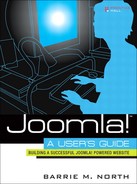I thought I would provide a much shorter version of Chapter 8, “Getting Traffic to Your Site” here. Use this if you already have a site ranked and want to see what you can implement to get your ranking higher.
Much of the information here is based on two 2007 studies about ranking in Google from SEOmoz.org[1] and Sistrix[2].
The number one factor in ranking a page on search engines is the title tag. These are the words in the source of a page in <title> and appear in the blue bar of your browser.
Choose the title of an article very carefully. Joomla will use the title of the article in the title tag (what appears in the blue bar).
Anchor text appears underlined and in blue (unless it’s been styled) for a link from one web page to another.
Try to get some inbound links to your article using the keywords you want to be ranked for. Two ways to do this are through online press services such as PRweb.com or simply by networking.
How many pages are linking to your page is called link popularity, or in Google, PageRank.
The more sites that link to you, the better. Joomla is a Content Management System (CMS) that helps you add content quickly. Create one quality content page per day. Quality content is the most important factor to getting inbound links. For a site that will perform well, you eventually need 200-odd pages of content. This is the important point: Quick SEO is dead!. The only way to perform well in SEO now is to have a rich content site.
When was the domain of the site registered?
There’s nothing you can do about this, but there is evidence that suggests that how long you have your domain registered makes a difference (spam sites are not registered for long). Go and extend your domain registration for a couple years.
This is the number of links to the page from inside your own domain.
Because of #2, it’s critical that you link to articles from within your site using the right anchor text. Make sure that you
Use the linked titles setting.
Make good use of the Most Read, Related Items, and Latest News modules.
Have a sitemap component linked to directly from your home page.
It’s important that you get quality inbound links. This means they have to be from a site that is topically related to yours and one that has a high PageRank. It’s worth submitting once to directories (then forget about it).
Type related:www.yoursite.com into Google and contact the top 20 returns for links.
Make sure you have a blog on your site and network with others in your topical community. Make sure you frequently link to other blogs in your topical community as well.
You need to make sure you have a high keyword density of the phrase you are optimizing for in the content of the page. Still important, the German study from Sistrix identified some interesting results:
Place targeted keywords in the first and last paragraphs. There is a simple trick here—write your quality content and then use the tool of your choice to find the keyword density. Then, take the top three words and add them to the meta keywords in the parameters part of the page (in Joomla admin). This is somewhat backwards for some maybe, but it optimizes a page for what you actually wrote, rather than making you write a page optimized for certain words (which I always find difficult).
Keywords in H2–H6 headline tags seem to have an influence on the rankings, while keywords in H1 headline tags seem to be getting less valuable. Modify the output of the core content component through a template override file.
Using keywords in bold or strong tags—slight effect, same with img alt tags and filenames.
The file size doesn’t seem to influence the ranking of a web page on Google, although smaller sites tend to have slightly higher rankings. Optimize those images!
Although keywords in the file name (URL) don’t seem to have a positive effect (based on the German study), a URL with few parameters (?id=123, and so on) is important. Turn on Joomla SEF but don’t get anal about it.
Too often, companies forget about error pages (such as 404 errors). Error pages should always re-direct “lost” users to valuable, text-based pages. Placing text links to major site pages is an excellent practice. Visit www.cnet.com/error for an example of a well-utilized error page. To make the error page fit with the rest of the theme of your site, create an uncategorized article and then copy the source as viewed on a web page, and put that into the 404 file.
You’ll see much of the discussion about SEO revolving around various SEF components. These components allow for advanced manipulation of URLs and meta tags. Neither of these were identified as a major factor in either SEO analysis. Joomla’s default SEF does a good job at removing extra URL parameters. Once turned on, you can concentrate on the much more important factors influencing your search engine rank, such as quality content and link building campaigns.
If you are more interested in Joomla SEO, I recommend Steve Burge’s Joomla SEO ebook. You can find out more about it at www.joomla-seobook.com.
